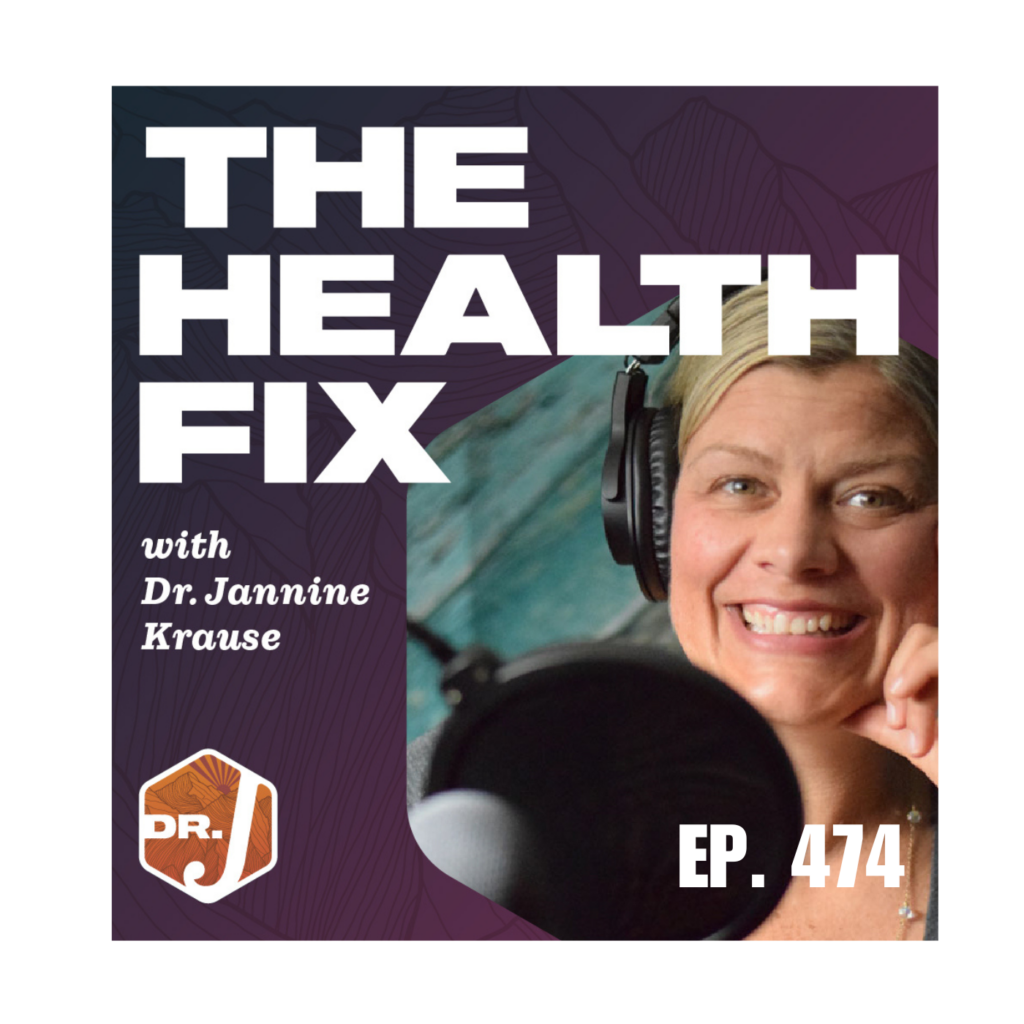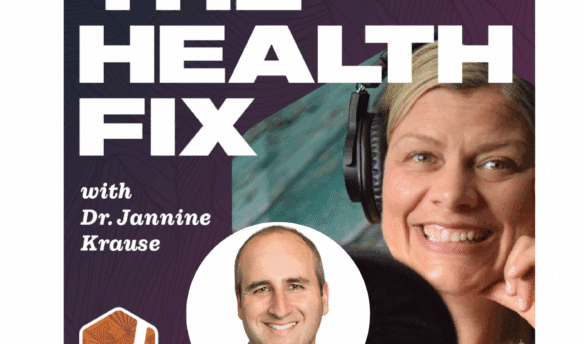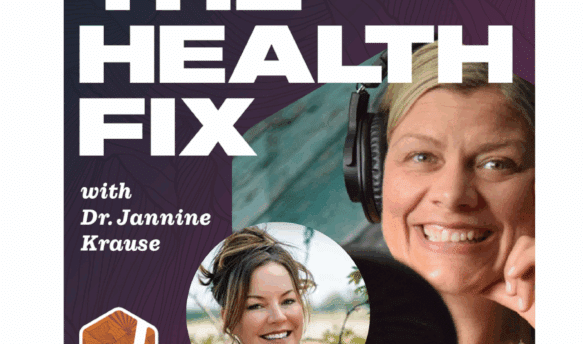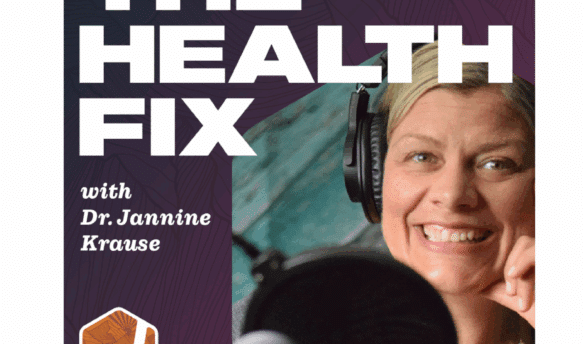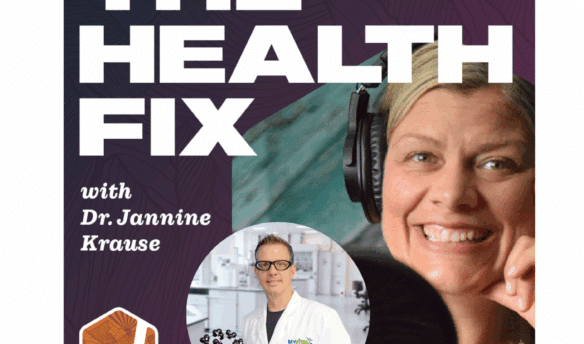Feeling puffy all over or under your eyes around your cycle or all the time? Noticing you feel better when you’re not in your home or at work all day? Having more rashes or unexplained brain fog, headaches? While all of these symptoms can be attributed to many things – it’s not uncommon for toxic indoor air and mold to be a factor…especially over 40. Homes built in the last 100 years are optimized for energy efficiency at the risk of poor indoor air quality! While not everyone that lives in a toxic home or that’s exposed to mold has symptoms it’s key to know what to do to prevent issues. As you spend more time on this earth your barrel of toxicity builds. The goal is to prevent it from overflowing and causing health issues. In this episode Dr. Jannine Krause goes into details on what she’s recommending to her patients to prevent and manage air quality and mold toxicity.
Dr. Krause’s Protocols
Instructions Included
Traveling soon? Looking to detox or reset your gut? Try one of Dr. Krause’s Fullscript plans.
What You’ll Learn In This Episode:
- Why changing your filters in your furnace monthly to every 3 months is key
- The importance of having a humidity sensor in the home
- How to assess your home air quality without wasting money on inaccurate testing
- What to do if you suspect you’re experiencing mold toxicity symptoms
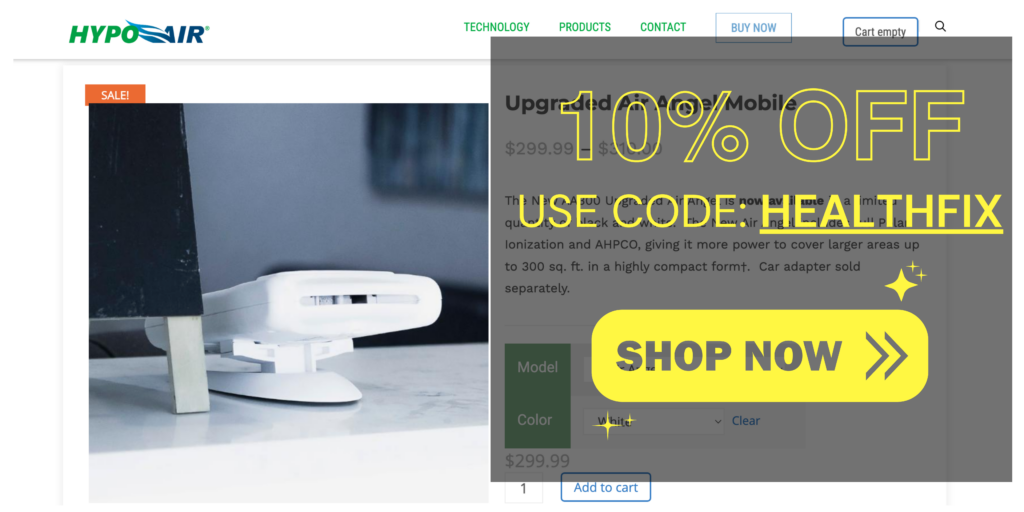
Resources From The Show:
- HypoAir – Complimentary Air Quality Consult
- HypoAir – Air Angel (what I use personally when traveling and in my home)
- HypoAir – discount code “HEALTHFIX”
- Cell Core Mold Detox Protocol – code to order:vK1FckRy
- Quicksilver Mold Detox Protocol – HERE
- Dr. Jill Mold Detox and information on Dr. Jill
Our Partners
Podcast Transcript
3:21 – Mold plate testing in my home
4:48 – How mold affected me
9:05 – Filters
10:27 – Glade plugins and artificial scents
11:43 – How to test if you have been exposed
14:26 – What you can do if you are being affected by mold
14:59 – Two companies I use for mold detox
15:40 – Where do mold spores hang out in the body?
20:00 – Mold detox
21:41 – Methylation
[Intro] Welcome to the Health Fix Podcast, where health junkies get their weekly
fix of tips, tools, and techniques to have limitless energy, sharp minds, and fit
physiques for life.
JANNINE: Hey health junkies, on this episode of The Health Fix Podcast, you get me, Dr. Jannine
Krause. And so each Wednesday I’m going to be doing a series where I am covering a
little bit more on the topics that we talk about on the podcast because I feel like
There’s a lot of clinical information I have in my practice and my knowledge to be able to share and relate to
What you may be experiencing
So I just did a podcast with David Milburn and we talked about Hypo Air the company that I love
Their Air Angel which is a portable air filtration and and sanitization device
So you can put it in your car you can take it while you travel things of that nature now
Let me give you a little background on
Environment and air and and what I’ve seen in myself and some of my clients over the years
It’s really hot to talk about mold and how mold affects our health and it is a real deal
It is not just folks who are
Super sensitive and want to complain. This is this is a big deal and as we get over 40
We tend to become more sensitive to certain things like maybe you’re noticing more food sensitivities
Maybe you’re noticing more environmental allergies and you never had those before
Mold is something that you can react to and I found myself reacting to it
When I was living in Tacoma and now as I’ve moved to different places
I also find that I’ve reacted to things if a home is particularly
multi
So what’s going on? My barrel, if you will, I like to think all of us as barrels.
We can handle a certain amount of things coming in and at some point we overload.
How do we overload with histamines?
Histamines are a normal neurochemical within the body that is a sign of danger, but it also helps you with digestion.
So it’s kind of one of those
you don’t want too much of it, right?
But you do want some of it so we don’t want to be completely blocking histamines because now we’re gonna mess with our ability to digest foods
But at the same time when histamines are overloaded we are starting to see rashes. We’re starting to see
swelling so puffiness around the eyes. We’re also starting to see that we may be
smelling things more often and reactantly getting a headache or just not feeling good or we may be noticing things like
We are having more heavy periods or we’re getting more puffiness in the body that comes and goes
Maybe it’s related to a cycle or maybe it’s related to an exposure to something
So in my personal experience definitely want to give you my story. I
Found mold in my house in Tacoma and I panicked because I have patients that have had some really severe
cases where they
have mood swings, they are feeling, having insomnia, they’re just not feeling well.
And I thought to myself, “Oh my gosh, I don’t want to go down that route.”
Well, I did the testing, which is controversial.
I used mold plates and I put them in my home and I let them be for an hour, came back,
closed them all up, put them into a dark bag in a warm place and let it grow fur.
a week. And the results were overwhelming in two places. My bedroom and in my kitchen,
which makes sense, right? The kitchen can be a source, especially under the sink if there’s
a leak. My bedroom, we weren’t really sure what was going on there. We figure there might
have been something in the walls. Not sure. However, my house was built in 1914 and the
Foundation was leaking. We had a river through our basement anytime there was a major storm, so
Made sense that there would be some humidity something in the house
So is that the case in every home? Well most homes
Unfortunately that have built then built within the last 100 years or not built for
Helping with preventing mold. They’re built for energy efficiency
So they can be like a quadrupled whatever the limit is of that. I don’t know but lead certified amazing
energy efficient home
but
those folks are not thinking about airflow and
In 1914 they were not thinking about airflow and even in my newer home now that I have that was built in 1990
They were wrapping them with plastic. That’s a different story. I’ll get there in a little bit
So point being is that I knew I had to mitigate this because I was noticing I was waking up every morning with very big puffy eyes
eyes, top of my eyelids were extremely puffy. I was feeling gross, my periods were getting
heavier. Now here’s the thing, mold mimics estrogen. So if you’re already in perimenopause
and you’re on a roller coaster of hormones and now you’ve got mold on top of it that
you’re reacting to, this can make things really intense. So period cramps, debilitating cramps,
loading, puffiness, changing, you know, dresser or pant size, if you want to think about a couple,
you know, going up a couple sizes and back down based on where you are in your cycle.
This stuff is real and I really want folks to think about like, okay, we sometimes poo-poo
the idea of mold and sick building syndromes and things of that nature, but they really can
impact us, especially as we get older or as we are young, a lot of kiddos have issues in this
this department and I kind of wonder if maybe as a youngster I might have been
also exposed and that might be why I’m more prone to being able to really pick
out when I walk in a building if I smell mold. My home here in Illinois where I
grew up where I’m actually recording this podcast right now I have definitely
noticed mold we’ve tested for it it’s positive and I’ve had some issues.
Now here’s the thing, you may be thinking,
“What do I do if practically every home has some sort of mold?”
Well, the good news is we can figure out
how to prevent mold from overgrowing.
We can figure out if we have an issue in the first place
and there’s a lot we can do.
Now, if you recall, I interviewed David Milburn
from HypoAir.
HypoAir does free air quality consults.
Yes, they have air mitigation processes.
They have different tools and tips and products,
but a free call to learn how to improve your air quality
in your home, priceless, priceless.
So I first recommend checking in with them.
The other thing is getting a humidifier,
or sorry, a dehumidifier or a humidity sensor.
‘Cause you wanna first know,
like is your area having an issue
with humidity in the first place.
So I have folks grabbing a sensor
or even those weather stations,
you can see what the humidity is outside.
You can see what it is inside.
Those are also another great tool to be able
to identify what’s going on.
And in our podcast, David recommends humidity.
You want it to be under 61%, 65 on the high end.
I try to keep my house under 60.
And you know what that requires?
I have to probably empty my dehumidifier
about two to three times a day in the winter.
That’s crazy, right?
My house was wrapped in plastic.
It wasn’t meant to help with airflow at all.
And this is the thing, especially in the houses
that were built in the 90s, early 90s.
It was a thing to wrap houses in plastic.
So if you have an early 90s house,
you might wanna think about that
because they were looking at energy efficiency, not airflow.
That brings us to airflow.
That is where David Milburn can really help you
in terms of your flow of air through your house,
your apartment, your condo, whatever it may be.
I had to consult them ’cause I had no idea
what was going on with the airflow in my new house.
And turns out, that wasn’t that great.
So we had to work on a couple of things
to strategically place our air filtration systems
to get things better.
So we have one in our living room,
we have one in our bedroom,
and then the hyperware lives in our kitchen
to help with flow within the home.
So looking at my notes really quick.
Okay, so in terms of that,
the other big thing a lot of folks think about is filters.
So filters for your furnace.
Always a good idea.
We only change them sometimes once a year,
once every three years.
When we remember, you wanna be thinking about it
more frequently.
And depending on the severity of your sensitivities,
you wanna be thinking between every three months
to every six months or so.
Some folks, it’s once a month,
especially if the pollens are really something
you were sensitive to.
So these are things to really write on your list of to-dos
as your home hygiene, if you will.
Now, another biggie is having the air filtration devices.
Like I said, the different places that I have them
strategically placed, you wanna be making sure
that they are close to areas of outflow
or inflow of air in your home.
Some cases I have heard of folks living in apartments
where the neighbor smoked and the air was coming around
from the windows and getting into that person’s apartment.
That’s awful, right?
So how do you mitigate that?
There’s those kind of things.
There’s also people who,
as neighbors are smoking right outside
of where their air intake is.
So you wanna be really thinking about your inside environment,
but also what’s going on around your home,
your domain and what your neighbors are doing.
Another biggie that I’ve encountered with patients before
is glade plugins and synthetic scents
in the home causing issues,
but also in the neighbor’s apartment.
The scents are coming across from one bathroom
to the other crazy, but these are how things
are connected in apartments that I have no understanding of.
And so what this gal had to do is work on filtration
within her bathroom to filter out the synthetic scents
coming through the bathroom.
Crazy.
How this happens?
I don’t know.
So anyway, those are ways to be looking
And there are multiple other things such as where your heating and cooling system are placed
Lots of technical issues. This is where David Milburn comes in from high-bar because I am not a
Engineer or airflow specialist when it comes to these things. That’s what they do now
I
Am here to really help folks understand that say you’re getting older say you’re becoming more sensitive to the environment
you’re feeling like, man, I have perhaps have multiple chemical sensitivities.
Maybe you do.
Maybe you’ve been exposed to multiple things in your barrel is overflowing.
What do we do clinically, like internally, to try to help the situation?
A couple different things.
One, I will test people for mycotoxins for MOLP.
So that’s a urine test.
It comes to your company called Mosaic.
It used to be called Cray Plains Labs.
use them in my office for testing mold because it’ll show mold toxins.
Now the other way to do it is something called the Cyrex array 12, which is an antibody test
in the blood to the molds.
And that also looks at pretty much any kind of chronic infection that could be floating
around on the body.
So it’s looking at yeast, it’s looking at bacteria, it’s looking at viruses.
if you’re like, is there an immune component
that I am hijacked by bugs in addition to mold?
That’s the test you wanna look at.
Now, if you are going, okay, I don’t really know
if I wanna spend the money on the test, totally fine.
Maybe you’re thinking, well, how do I test my home?
Air quality specialists that walk around with their wands
and they’re super expensive waste of time, waste of time.
Nine times out of time, they don’t find anything
because they’re gonna be pulling still molds
from outside and inside, it’s confusing information.
I use the plates like I described.
That is from a company EC3.
I’ll put the links in my podcast notes
at doctorjkrausend.com.
Those guys, it’s very basic.
It’s like $36 just to get a read, right?
We’re not gonna know what specific type of mold is there.
You’re just gonna see if things are growing.
A lot of people will dispute
that those are highly inaccurate.
Fair enough.
If you compare it, if you combine that
with looking at your humidity and your humidity’s over 65,
you pretty much know that you could be harboring
mold spores in your home.
So yes, there’s a lot of, where do we go from here?
There’s also Ermy testing,
which is like taking a Swiffer wiper
and you’re wiping the areas where you see the mold
and you’re wiping your airflow in,
taking out, put vents and getting in there.
And that’ll tell you what you’ve got.
Now here’s the thing, there are some issues with inside,
outside molds and contaminants.
And as David described in our podcast,
those wipes could have already contaminants on them.
Crazy, but I do get a good idea
of how high things are using those.
And I have used them, especially in apartments.
I will use those.
So when you’re looking at this,
I don’t wanna scare folks.
Mold toxicity can sound super scary and yes, in some cases it can be very, very detrimental to health.
But there are things you can do.
First and foremost, what I’ve learned in this, let’s say, realm of helping folks is if the symptoms are an annoyance,
meaning we’re noticing period changes, we’re noticing puffiness, but we’re not having an impact to function of life.
There’s just annoyance. I don’t think we need to go super crazy. I think we can go on a mold detox
and work on airflow in the home fix the home air quality and and call it good. So what’s the best
way to detox mold? I like Cellcore. Cellcore is a company that I use regularly to help me to
bind up molds and clear them from the system. The other one is Quicksilver. There is a whole
mold detox protocol that a specialist in mold, Dr. Jill created. And I will put that link there.
I’ll put cell cores link it as well. So you can see what is going on in those departments because
it is possible to mop up the mold spores and get them out of the system and just help you
to feel better. Now you might be thinking, well, mold spores, where do they live? What’s going on?
Oftentimes they hang out in your gut and they can hang out anywhere in your body
but oftentimes they’re in the gut. They can be up in the sinuses as well.
And so they can cause sinus issues, gut issues, and they can mimic things like
SIBO, small intestine, bowel or small intestine, fungal,
fusifo, symptom so gas, bloating, things of that nature,
and then hypersensitivity with rashes and puffiness.
More often than not, mold affects your hormones.
So this can be especially if you’re still cycling crazy hormone swings in terms of puffiness around
the period insomnia and also having just mood swings that you can go real low and be really
down the dumps or you can be super like I would say not wanting to associate with other folks
isolating in that case. So if that is happening to you, number one, like I said, go get your
airflow assessed, call, hypo air, find out what’s going on with your home. Also, I
would talk about your work environment because you spend a lot of time there.
Some folks, it’s not their home. It’s their work that’s actually causing the
issue. Some folks, it’s the car. I found mold in my car when I realized that my
windshield was leaking. And I would venture to say that a lot of homes
probably in the Midwest or even in the Pacific Northwest because of the amount
of rain in the Pacific Northwest or Midwest, the humidity or South because of the humidity,
those areas are more prone to having mold in cars or if a car is been in a flood.
Obvious, right? So things to think about in that department here if you spend a lot of time
in your car. So with mold, the treatments, I had mentioned Cell Core. I had mentioned that I
sometimes I’ll say is Quicksilver. What types of treatments are these? What are they doing?
They’re meant to bind up the mold spores and pull them off the lining and then eliminate them through
the system. Sometimes you can feel quite crappy during the process. So you want to schedule it,
you want to make sure that you have time, maybe take a week off of work or do it over a long
weekend to try to clear some stuff and then back off during the week and heavier on the weekend.
It sometimes takes a couple months, sometimes years, of a low level protocol to clear the
mold from the system. Now, I do not claim myself to be a mold specialist. Dr. Jill,
I can’t think of her last name, it’s Carnehan there it is. Dr. Jill Carnehan, she’s in
she’s in Colorado, just outside of Boulder. She specializes in mold detoxing and things of that
that nature I will put her contact there for you. I just am here to promote awareness on the subject.
Yes, I do have a couple of patients that I work with, but
when it gets really severe and you become to a point where it’s hard to leave your home because
you are not feeling good, you’re non-functional in terms of your sofa teeth, you can’t get out
of bed things to that nature, you need higher level care. And in some cases there are folks who
are doing what is known as an Ibu type of treatment, which is an ozone blood treatment, meaning you
get your blood taken out kind of like dialysis, they clean the blood, they expose it to UV light
to sterilize it, and then they put it back in. Kind of sounds super crazy, I have had folks
have that done and feel a heck of a lot better, but there are some risks with that. And you know,
things you want to be looking into if you have to go that route. And so some of the severe cases
that will go that route, other cases, it’s just about working on your airflow, working on your
humidity in your home, getting a good deep clean of the home. Maybe someone else does it not you,
because that can be provoking. And then you’ll start to feel better along with working on
the mycotoxins and things of that nature. Now, some people might have so much damage in an
apartment, home, etc. You have to get out of there, especially if it’s stachybotrys,
which is black mold, toxic black mold. Now, more often than not, I
haven’t seen this to be the case, but I’ve had a couple patients who have
completely remodeled our home, mitigated the situation, all is good. So, you’re
looking for leaks, you’re looking for your humidity, you’re working on mold
detox. Now mold detox involves taking the biofilm and the biospores out of the
gut out of the body. We use things like silver, we use diatimaceous earth, we use binders.
So zeolite. Chlorella is actually a good binder too. And we take that and grab things and dump
it through the system. Now, one of the things you want to be thinking about when you go
through any type of detox is your lymphatic system working. And is your gut working? Are
you able to urinate out things like are you peeing? Okay, like our kidneys? Okay. Those are three
biggies because if you have puffiness and you’re getting puffy every other week or every month
along with your period that means your lymphatic system is not working optimally. Most people have
terrible lymphatic system movement in their neck and upper body because of being hunched over
computers and tech. So huge things to be thinking about. Now what’s my protocol? I have folks make
sure all of those areas are moving. Wow, I will have someone go see a lymphatic specialist or work
on their lymph drainage massage. I will also have folks do, you know, rebounding to help
move lymph. Things of that nature, gotta make sure your bowel is only moving so we gotta
work on that. So oftentimes we’ll do a liver and lymphatic clearing. This is why I like
Cell Core because they have the kidney liver and lymphatic. Lymph active is the name of
it protocol to clear all that out, then you move into clearing the mold.
Because if those areas aren’t moving, things are going to hang up.
The other area of hang up is within your cells.
About 50% of the population has a methylation defect that prevents them
from fully taking out cell trash in the processes of normal life,
meaning they’re easier to end up having detox issues.
So if we go to that level and usually these are your folks.
So if you are finding that if you have mold issues
and you are really fatigued,
you can’t get out of bed, you’re having trouble functioning,
your moods are maybe having you where you wanna isolate
and not go out into public,
you may have a methylation defect.
You can test your DNA, there’s easy ways to do it.
Even 23 and me, which I know has gotten a bad rap,
they will look at methylation.
if you’ve done it a long time ago,
like a couple of years ago,
they were looking at methylation new ones,
they are not doing it.
So if you did it as a part of a package back in the day,
you can get those SNPs and you can go to geneticgenie.org
and you can download your raw data,
which means it’ll show you if you have MTHFR,
which is the methylation series of genetic defects.
Now, that’s a whole completely different podcast.
I’m just going to say it’s wise to know your genetics if you are struggling with chemical
sensitivities, mold sensitivities.
And in fact, I have to admit that the older I get, the more I feel like genetic information
can be useful to just really hone in and target and not play around with where we’re going
in directions with protocols when it comes to supplements and optimizing the body.
So that being said, if you’re looking at, hmm, do I maybe have mold
issues going on. Do I am I becoming sensitive because of issues like this? The number one thing
you want to do is get an assessment of what’s going on in your home first so you can clean up
the environment that you’re in most of the time. Work may be trickier but it’s it’s also something
to consider. Hypoair will definitely help you in that department it’s hypoair.com/consult and it’ll
It’ll be in my podcast notes at doctorjkrausend.com.
Because you’ve listened to this podcast,
hypo air also is giving you a discount.
You can enter the code health fix H E A L T H F I X to get.
I think it’s like 10% or something off of any of their products,
which is nice of them for helping,
helping, helping you out for listening to the podcast.
But nevertheless, I’m more wanting folks to look at their air quality and their
home and again, an assessment of it.
This is so important.
Even if you’re not experiencing symptoms, this is optimize your health stuff here.
Huge, because your air quality has a lot to do with how you feel and how you function
and how your hormones stay in balance till you get into menopause and beyond.
Once the hormones stop fluxing so much, it might not be as much of an issue, but then
we start in with the rashes and other things that can happen with mold toxicities. So be
careful. And the idea is get your answers. Know what you’re working with. I highly recommend
knowing the humidity in your home. And if you live in in the south where it’s humid,
if you live in the Midwest where it’s humid, or if you live in the Pacific Northwest where
it just fricking rains all the time, probably could say East Coast too. Really unless you
live in the desert. But here’s the thing. I’ve also seen mold issues in the desert too.
So point is anybody who has a house, apartment, lives in a home, it’s time to look at things
and see what’s going on.
Even campers can have their own issues.
Talk to hypoair.
Now working on your air filters regularly, not just every year, and really making sure
you’re getting a high quality one.
Looking at your air filtration in your home and the systems you use, hypoair has their
own.
other companies out there that you can look at as well.
So the point being here is you spend a lot of time
in your home, you spend a lot of time in your workplace,
and if your home and your workplace are the same,
even more important to get a look at your home air quality
because these can affect, the air quality can affect
lots of things in your life right down to your sleep,
which is what I’m going to be talking about next week
in my mini series and how I’m addressing sleep
in terms of sleep supplements to help folks
while they’re working on rewiring their brain
when it comes to sleep.
So for all the things I’ve noted in this podcast,
head over to doctorjkrausend.com, episode 474,
and you will learn all of the tidbits
that I’m using to help folks to regain balance
with multiple cities and chemical sensitivities
in their environment.
All right, stay tuned for the next episode
where I am going to be talking about sleep and more detail.
Have a great day, whatever you’re doing.
[Outro] Hey, health junkies, thank you so much
for listening to another episode of the Health Fix podcast.
To help support my mission,
to bring you tips, tricks, and tools
to help you optimize your health, I’d be grateful
if you’d like, subscribe, and write me a review
for the podcast.
And if you hear a product you’re interested in on the podcast,
you can now go over to my website to learn more.
That’s Dr. spelled out J, K R A, U S E, N D dot com.
Just click on shop and you’ll find all the information
on my favorite products that I stay behind
and use myself.
All affiliate income earned with your purchases
goes directly to help support the production of the podcast.
so I can keep bringing you quality health information.
I appreciate your support,
and I’m honored to have you listening
to my podcast as a fellow health junkie.
Thanks again.
(upbeat music)
Hey fellow health junkie.
Thanks for listening to the Health Fix podcast.
If you enjoy tuning in,
please help support me to get the word out about the podcast.
Subscribe, rate, and review,
and just get that word out.
Thanks again for listening.
– [Music]
